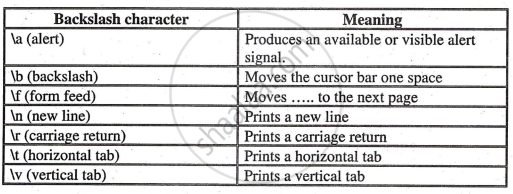Topics
Number Systems
Program Analysis
Introduction to C+ +
- Introduction to C++
- Character Sets
- Standard I/O Strems in C++
- Type Modifiers
- C++ Data Types
- Variables in C++
- Constants
- Compiler Tokens
- Operators in C++
- Comments in C++
- Scope and Visibility
- Control Statements
- Functions in C++
- Default Arguments
- Techniques used to pass Variables into C++ Functions
- Function Overloading
- Inline Functions
- Recursion
- Pointers in C++
- Arrays in C++
- References
- Type Conversion in Expressions
Visual Basic
- Introduction to Visual Basic
- One language Three Editions
- Study Of Integrated Development Environment (IDE)
- Visual Basic Programming
- Few Common Methods
Introduction to Networking and Internet
- Introduction to Networking and Internet
- Networking Terms and Concepts
- Types of Networks
- Network Security
- Network Configurations
- Network Applications
Variables & Constants
Variable
A variable names a memory location for storing constants (integer, real, or character). Its type depends on the constant it holds. In C++, variable names follow these rules:
- Can include alphabets, digits, and underscores.
- Cannot start with a digit.
- Are case-sensitive.
- Cannot contain special symbols other than underscores.
- Have no length limit.
After designing the suitable variable names, we must declare them to the compiler before we use them. Declaration of variable does two things. i) It tells the compiler what the variable name is. ii) It specifies what type of data the variable will hold.
The syntax of declaring a variable is :-
data-type v1,v2,v3................vn;
Constants
Constants are declared with the "const" keyword, a type, their name, and an assignment of their constant value. This value must match the declared type and is fixed for the duration of the program. Syntax:
const data type const_name = value;
Integer Constant
Integer constants are whole numbers. Rules for constructing them:
- Must have at least one digit.
- Cannot have a decimal point.
- Can be positive or negative.
- Assumed positive if no sign is given.
Floating Point Constants
Real constants are often called floating point constants. Real constants are fractional numbers. They could be written in two forms, fractional form and exponential form
Character & String Constant
Any single character from the character set is a character constant. It is declared by enclosing the character digit in a set of single inverted commas.
There is a different type of character constant which is called Character escape sequences. Back slash (\) alters the meaning of the character that follows it.

A string is a set of characters enclosed in double quotes. For example, some valid string constants are :
"Hello!"
"This is a string"
A string may consist of any character from a character set. Observe that 'A' is single character constant, and is different from "A", which is a string.
Defined constants
The #define directive causes a macro or symbolic name to be defined as a macro.ie.it sets up an equivalence between identifier and a text phrase.
Symbolic constants: - “Enumerations”
In C++, you can define custom data types using enumerations. An enum declaration introduces symbolic constants for related values.
Syntax: `enum typename {enumeration-list};`
- enum is the keyword.
- typename names the type.
- enumeration-list includes the names of integer constants.
